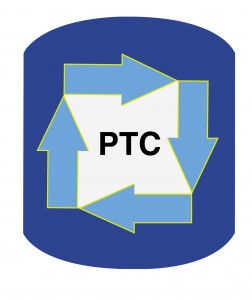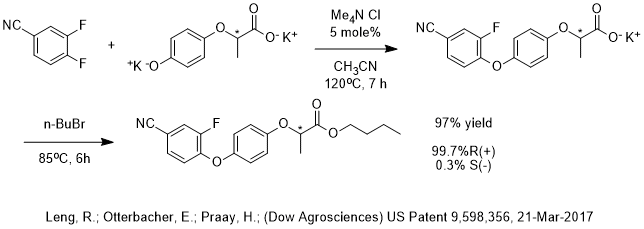The key point of this patent was to avoid racemization while performing a somewhat high temperature nucleophilic aromatic substitution under basic conditions followed by an esterification. Both reactions work well without PTC but some racemization is observed and that is what the inventors wanted to minimize.
When the nucleophilic aromatic substitution was performed without PTC by mixing the optically pure hydroxyphenoxy propionic acid with 3.3 equiv of potassium carbonate then adding the difluorobenzonitrile, then adding butyl bromide for a nucleophilic aliphatic esterification, the optical purity was not too bad but not optimal either at 98.5% R(+) : 1.5% S(-).
When using TMAC and the pre-formed dipotassium salt shown in the diagram, the optical purity was significantly improved to 99.7%:0.3%.
The inventors do not cite why the use of tetramethylammonium chloride with the pre-formed dipotassium salt gives less racemization, but one may speculate that it is due to the lack of exposure of the starting material to excess base that causes racemization plus running the two reactions at lower temperatures, which were 120 C for the nucleophilic aromatic substitution with TMAC versus 135 C without TMAC and 85 C for the esterification with TMAC versus 100 C without TMAC. [Personal shout out to my friend Eric, one of the inventors with whom I worked in 1710 Bldg at Dow AgroSciences 30 years ago!]
This patent illustrates several strengths of phase-transfer catalysis including reducing the energy of activation of nucleophilic aromatic substitutions and esterifications which can be further leveraged to improve selectivity.
If your company wants to benefit from the most highly specialized expertise in industrial phase-transfer catalysis, now contact Marc Halpern of PTC Organics to explore leveraging the best PTC expertise available with your company’s commercial goals for low-cost high performance green chemistry using phase-transfer catalysis.


